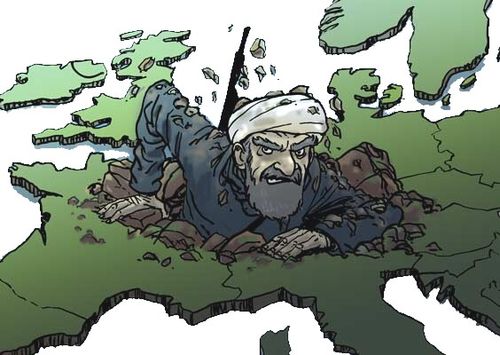Unraveling the Islamization Debate in Nigeria: Understanding Perspectives, Extremism, and the Secular State
By
Patrick Anum
For years, Nigeria has been engaged in discussions about the perceived threat of Islamization. This topic has sparked diverse viewpoints, with some dismissing it as mere conspiracy theories, while others express genuine concerns.
Additionally, there are individuals within the Muslim community who view it through the lens of intolerance and Islamophobia. In my latest column for the Middle Belt Times, I delve into this multifaceted issue, aiming to shed light on the different aspects surrounding the Islamization debate.
One observation I have made is that many Muslims in Nigeria adopt a defensive stance, which, in my opinion, is unnecessary. There appears to be a misunderstanding regarding the nature of what such a threat would most likely entail.
While ordinary Muslims believe it to be the spread of regular Islam, those discussing it refer to fundamentalist doctrines that even Muslims in Nigeria may find hard to accept. Boko Haram serves as a significant case study, as it became too extreme even for Ansaru and Islamic State, leading to a breakaway.
This highlights that these ideologies are not aligned with regular Islamic doctrines. And if a group like Islamic State cannot stomach these doctrines, how can one imagine muslims in Nigeria would fare? Many experts like Col Adewunmi have attributed this problem to a certain elite in the country while other experts have also attributed the deliberate efforts to keep the population uneducated as an avenue which creates a fertile ground for radicalism.
Intolerance in our diverse society is an alarming indicator that society is veering off course. The Yoruba Muslims’ role in the 1979 constitutional drafting committee exemplifies the importance of replicating diversity and incorporating tolerance not just in society but also in politics.
From a perspective of tolerance, we witness fewer individuals embracing the ideologies of the ’70s, which could be problematic in a multicultural nation like ours with an example being the defense of the Muslim/Muslim ticket in the just concluded 2023 Presidential elections.
The rise of groups like ISWAP, Ansaru, and Boko Haram, with their growing local recruitment, underscores the consequences of unintentional educational policies in combating radicalism. I had the opportunity to speak with an Algerian Muslim who revealed that their government’s approach to extremism has been swift.
In Nigeria, however, it festers due to the interests of certain elites who favor such an environment, and they are not shy about this fact. It is important to emphasize that this issue is nota debate about the Christians versus Muslims or Traditionalists and should not be viewed in these lenses; however it should be viewed as a conversation around combating the spread of radical ideologies.
Given Nigeria’s status as a secular state, it is crucial for Muslims to take the lead in ensuring that all ethnic gruops and people of diverse religious affiliations feel involved in society and governance and that the country remains non-aligned with religious organizations, be it Christian or Muslim.
These issues if not adequately addressed have the potential to tear at the fabric of our nation. I still recall the sense of impending doom when Ibrahim Babangida secretly joined the OIC. President Buhari’s continued alignment with such organizations highlights the absence of steadfast moral codes among Nigerian leaders. It becomes evident that if there is no decentralization, there is a possibility that someone in power may seek to impose hegemony and implement radical ideologies favoring their faith or religion in the future considering the number of out of school children and high levels of illiteracy in the country.
One troubling aspect of radicalism is that it often begins with targeting individuals of other faiths before turning on those within the same faith. This highlights the urgency of addressing this issue collectively. But more importantly, these fundamentalists being linked or allegedly sponsored by elite is worrisome in our country and Nigerians would need to have very serious and honest conversations about these issues going forward.
In light of the ongoing Islamization debate in Nigeria, it becomes imperative for all citizens to stand united against any form of radicalist ideology. The preservation of secularism should be our shared priority, transcending religious and cultural boundaries.
This call to action stems from the realization that radicalist ideologies pose a significant threat to the peace and harmony of our diverse nation. It is crucial that we reject these extremist narratives and embrace a path that upholds our secular values.
While acknowledging the existence of differing opinions on the Islamization issue, it is essential to distinguish between regular Islam and fundamentalist doctrines. Nigerian Muslims, who make up a significant portion of our population, often embrace Islam as a peaceful and inclusive religion.
However, the concerns raised regarding Islamization are primarily directed at the propagation of radical and intolerant ideologies and must not be confused in any other regard.
As such, moving forward, we must use tolerance as a litmus test in accessing the health of Nigeria with no exceptions.


